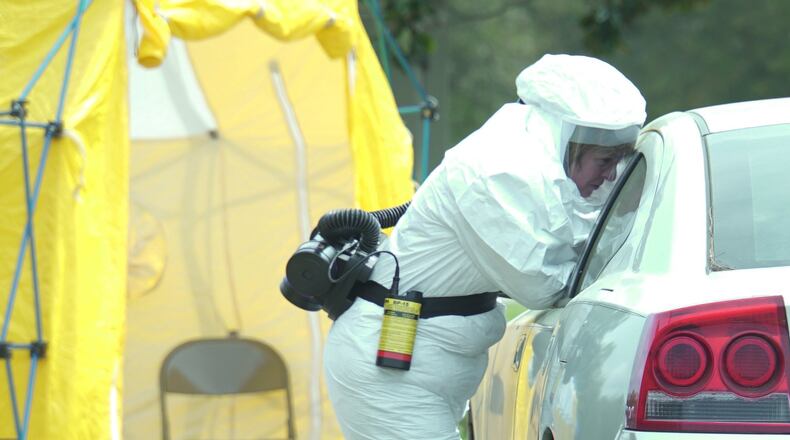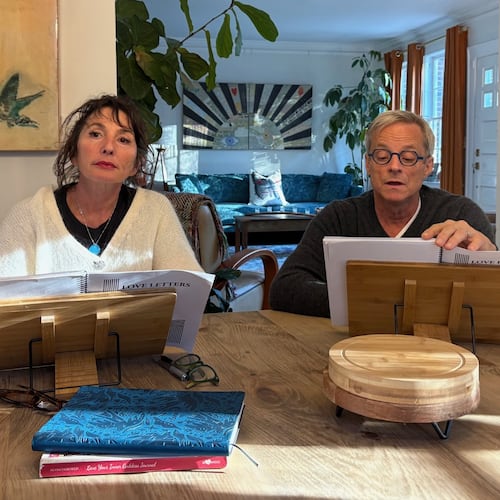As the number of coronavirus victims increases each day, as politicians declare states of emergency, and some young folk refuse to heed any warnings, the rest of us are freaking out.
These are no doubt fearful times.
And so we find ourselves sheltering inside, away from our friends and neighbors, school classmates and even our places of worship. Restaurants in some places are prohibited from inviting customers inside. Entertainment venues are canceling concerts and other events. Public parks and beaches are closing — all to prevent further spread.
Normal things like eating out, working and socializing have become dangerous.
THE LATEST | Complete coverage of coronavirus in Georgia
There’s a reason Jesus told us “do not be afraid.” Fear produces despair, it causes us to lose touch with reality.
There’s little doubt that this virus is real and deadly, but we shouldn’t allow the fear of it or its impact on our 401(k)s to consume our waking lives.
Joe McCormack, author of the new book “Noise: Living and Leading When Nobody Can Focus,” has something to say about that, but first a couple of disclaimers: He is neither a medical doctor nor an economic adviser.
McCormack teaches military units and corporations how to be clear communicators, to think in an age where a lot of things are competing for our attention.
“We’ve moved beyond information and are now generating a swell of noise,” McCormack said. “The messaging around the coronavirus is amplified to deafening levels. People are consuming hysteria, and it’s not doing us any favors.”
RELATED | Are fears about coronavirus affecting metro Atlanta church services?
“Noise” is what he calls information overload from work emails, app notifications, the 24/7 news cycle, and social media updates.
“It’s like food,” he said. “We need it to nourish ourselves, so we keep eating, but what we’re eating isn’t good for us.”
If you suddenly see yourself in that description, beware. You probably also find it impossible to focus. Your brain and body are literally doing jumping jacks.
Given the near-constant news coverage and social media chatter around infection rates, death tolls, travel restrictions, stock market swings, and ominous predictions on how dire the pandemic may get, it’s understandable.
Even without the coronavirus, the news can leave us in constant flux. And yet afraid we might miss something, we succumb to the noise all day every day or we go to the other extreme and avoid it altogether.
Like the president is prone to do, we blame the news media, but we really shouldn’t. Each of us, McCormack said, is responsible for what we consume and even how we react to it.
Credit: The Atlanta Journal-Constitution
Credit: The Atlanta Journal-Constitution
“You can’t blame that on somebody else,” he said. “People need to practice self-discipline. Just because the news cycle is 24 hours doesn’t mean I need to listen for 24 hours.”
So how can we neutralize the noise around the coronavirus?
RELATED | Church, a safe haven lost
McCormack offers five tips:
• Understand how the over-consumption of bad news affects you. When something becomes the only thing, it becomes everything, says McCormack. You start believing the world is coming to an end. And when all your waking hours are spent anxious, nervous, and anticipating the worst, you not only start to miss all the other stuff in your life, you pass fear on to others.
• Don’t confuse predictions with certainty. You’ve probably heard the adage that FEAR stands for False Evidence Appearing Real. That’s important to remember at times like these, notes McCormack. People tend to make dire predictions with such certainty that you start to believe them, but really, they simply do not know. Remember all the past cases of flu and viruses that were supposed to decimate humanity — but didn’t.
• Temper your consumption. Thanks to the 24/7 news cycle, you’re likely to see the same story reported 17 times and said 17 slightly different ways. It’s not healthy to dedicate all your bandwidth to one fear-producing story. But if you’re tempted to blame the media, don’t. It’s their job. It’s up to you to turn off the TV, shut down the computer, and walk away.
• Focus on the facts, not wild speculations or possible domino effects. Find one good source you trust and stay abreast of the situation. Pay attention to what you can control: regular hand-washing, reasonably stocking up on bottled water and other supplies, postponing flights to coronavirus “hot spots,” and so forth. If you can’t impact it, don’t focus on it.
• When others are talking, change the subject. Don't pile on. Be the voice of calm and reason. If they won't drop the subject, have a few reassuring talking points in reserve to help put things in perspective and defuse fear. The CDC website (cdc.gov) is a good source for this.
At the end of the day, each of us has to believe that life is precious and lower the volume so that we can really discover what’s important in our lives.
“We have to manage noise or it will manage us,” McCormack said.
Find Gracie on Facebook (www.facebook.com/graciestaplesajc/) and Twitter (@GStaples_AJC) or email her at gstaples@ajc.com.
About the Author
Keep Reading
The Latest
Featured






